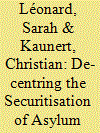|
|
|
Sort Order |
|
|
|
Items / Page
|
|
|
|
|
|
|
| Srl | Item |
| 1 |
ID:
189106


|
|
|
|
|
| Summary/Abstract |
This article contributes to the debates on de-centring the analysis of migration governance in Europe by focusing on the potential role of external actors in the securitisation of asylum and migration in the European Union (EU). Although there has been a growing amount of literature on the securitisation of asylum and migration in the EU, the role possibly played by external actors in this securitisation process has not been considered to date. This article addresses this gap using the case of Turkey. Theoretically, it contributes to the development of the securitisation framework by de-centring the study of securitisation processes. It argues that, from the vantage point of an external actor, a securitisation process highlights the existence of a vulnerability to a specific phenomenon that is perceived to be threatening. An external actor can then decide to exploit this vulnerability for its own gain, notably by making threats that play on the fears of the other political actor. Empirically, the article demonstrates how the Turkish government has been able to exploit the vulnerability of European countries to migration flows, which had been highlighted by the social construction of asylum and migration as security issues. By repeatedly threatening to send more asylum-seekers and migrants Europe’s way, the Turkish authorities have managed to secure some significant financial and political benefits for themselves in the last few years.
|
|
|
|
|
|
|
|
|
|
|
|
|
|
|
|
| 2 |
ID:
136870


|
|
|
|
|
| Summary/Abstract |
The Lisbon Treaty, which entered into force in 2009, considerably reinforced the powers of the European Parliament. This article examines to what extent the European Parliament has become an important actor in EU counter-terrorism by focusing on the external dimension of this policy. It also analyses the impact that this potentially changing role has had on the external dimension of EU counter-terrorism. This article puts forward two inter-related claims. Firstly, the role of the European Parliament in the external dimension of EU counter-terrorism has significantly grown in recent years. Following the entry into force of the Lisbon Treaty in December 2009, the European Parliament has become a fully-fledged actor in the external dimension of EU counter-terrorism. Secondly, the reinforcement of the role of the European Parliament has also led to a strengthening of both accountability and oversight in the external dimension of EU counter-terrorism, although there are still some limitations in that respect.
|
|
|
|
|
|
|
|
|
|
|
|
|
|
|
|
| 3 |
ID:
131635


|
|
|
|
|
| Publication |
2014.
|
| Summary/Abstract |
This article examines how the governance of justice and internal security in Scotland could be affected by the outcome of the Scottish independence referendum in September 2014. The article argues that it is currently impossible to equate a specific result in the referendum with a given outcome for the governance of justice and internal security in Scotland. This is because of the complexities of the current arrangements in that policy area and the existence of several changes that presently affect them and are outside the control of the government and of the people of Scotland. This article also identifies an important paradox. In the policy domain of justice and internal security, a 'no' vote could, in a specific set of circumstances, actually lead to more changes than a victory of the 'yes' camp.
|
|
|
|
|
|
|
|
|
|
|
|
|
|
|
|
| 4 |
ID:
134273


|
|
|
|
|
| Summary/Abstract |
Does the Arab Spring provide a new opening for Western cooperation with the Middle East? The Arab Spring involved a revolutionary wave of demonstrations and protests in the Arab world, starting on 18 December 2010, which forced rulers, at least partially, from power in Tunisia, Egypt, Libya and Yemen. Egypt, however, has since seen a reactionary movement re-establishing military power to the pre-revolutionary state. Additional uprisings occurred also in Bahrain and Syria, the latter escalating into full-scale civil war. A number of other countries have also seen serious protests, ranging from Algeria, Iraq, Jordan and Kuwait to Morocco. It is particularly noteworthy that the fallout from the war in Libya has had side effects for a simmering rebellion in Mali, where it appears that al-Qaeda is establishing itself in the north of the country. The European Union (EU) has been concerned about such an eventuality in the Sahel for some time. While some observers have drawn comparisons between the Arab Spring and the revolutions of 1989 in Eastern Europe, the precise endpoint and the direction of the Arab Spring revolutions remain to be identified. In short, the Arab world currently faces a period of social protest and change, which challenges our understanding of politics in the region and established assumptions about Western foreign policy towards this region.
|
|
|
|
|
|
|
|
|
|
|
|
|
|
|
|
| 5 |
ID:
129577


|
|
|
|
|
| Publication |
2014.
|
| Summary/Abstract |
Following several months of uncertainty in the wake of the rejection of the treaty establishing a constitution for Europe, the Lisbon Treaty eventually entered into force in December 2009. Although it fell short of establishing a constitution for the European Union (EU), it introduced several noteworthy changes, notably for EU internal security policies, also known as the 'Area of Freedom, Security and Justice' (AFSJ). This special section considers how various dimensions of the AFSJ have been affected by the Lisbon Treaty and the gradual reinforcement of supranational governance that it has generated in this key policy area. Over the past decade, the AFSJ has experienced tremendous development, making it one of the most dynamics areas of European integration. The AFSJ is a broad and heterogeneous policy domain, which includes asylum, immigration and border policies, counter-terrorism, justice and police cooperation, as well as the external dimension of these activities. Given the crucial importance of current internal security threats, such as terrorism, and the sensitivities surrounding policy responses to them, it is necessary to take stock of how far the EU has progressed toward its goals of an AFSJ and how this has been influenced by the most recent treaty changes. To accomplish this goal, this special section brings together some of the most distinguished scholars in the field and several younger scholars conducting cutting-edge research on the AFSJ.
|
|
|
|
|
|
|
|
|
|
|
|
|
|
|
|
| 6 |
ID:
151001


|
|
|
|
|
| Summary/Abstract |
Securitization theory seeks to explain the politics through which (1) the security character of public problems is established, (2) the social commitments resulting from the collective acceptance that a phenomenon is a threat are fixed and (3) the possibility of a particular policy is created. In the last decade, research on securitization has grown significantly. The aim of this article is to evaluate the achievements of securitization theory. First, its main concepts and premises are critically discussed. This article then proceeds to examine the empirical applications of securitization theory to a broad range of issues, as well as the theoretical implications of these studies. Finally, it discusses the main challenges faced by securitization scholars and puts forward strategies to overcome them. This article develops three inter-related arguments. First, notably thanks to empirical studies, securitization theory has significantly developed beyond its initial focus on the speech act. Second, as a result, the distinctiveness of securitization theory currently lies in its capacity to articulate a specific approach to security – influenced by the speech act – with an ‘analytics of government’, which emphasizes practices and processes. Third, securitization theory faces three types of challenges, related, respectively, to theory, method and methodology. The capacity of scholars to overcome those will strongly influence the extent to which securitization theory will be able to make significant contributions to the debates in Security Studies and International Relations in the years to come.
|
|
|
|
|
|
|
|
|
|
|
|
|
|
|
|
|
|
|
|
|